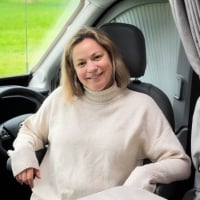80th Anniversary of VE Day

As we reflect, remember and celebrate the 80th Anniversary of VE Day as a nation, we thought it would be nice to look back at the contributions made within the touring community to help the wartime effort and we wanted to share these with you with some images from the archive of @camcc_curator (Instagram).
Mrs M.M.M. Fowler OBE, was Vice-President of the Caravan Club from 1936 - 1957, a dedicated caravanner and a Commander of the British Red Cross. After losing her husband in the First World War, she repurposed her Blue Caravans as mobile Red Cross first aid units. During the Second World War, these caravans were deployed in the Midlands, including during the Coventry Blitz. As noted in an article preserved in her personal scrapbook: 'When the air raids on Coventry were at their height, the Blue Caravan was in the thick of it – and escaped with only one mirror shattered and another cracked.'
Flying Officer Charles Agate joined the RAF Parachute Training School in Ringway during the War. He made his first jump on the day he arrived and finished the War as Ringway top scorer with a record of 1601 jumps. All whilst being based out of his trusty caravan.
Colonies of caravan dwellers were springing up outside the areas affected by nightly raids. These caravanners have their own women roof-spotters and Home Guard shown in this photo of a youngster keeping in step with a member.
Comments
-
Thank you Rowena. Interesting photos. We love the old caravan that is in the Gaydon Motor Museum, I cannot remember the exact details, but I think it was used briefly to house a refugee family either during or just after WW2.
The design of the caravan in the first photo is really interesting, look at the roof bulge above the entrance to give a little bit more headroom!
3 -
I have read about this also, Takethedogalong. Caravans were frequently used, particularly on those quickly constructed RAF aerodromes in the East of the country and used for a variety of purposes. As you said, they were also used as temporary accommodation for refugees too in a time when the Brits welcomed them during that era when Europe fought the common evil. We must remember our past correctly and both celebrate it and learn from it.4
-
My Irish uncle, from Dublin, couldn't join up in WWII as citizens from there were not allowed but he volunteered his services as a worker and moved over to the South coast to work in Tyre factories making tyres for Spitfires etc. He was housed, along with several other workers of the same ilk, in temporary accommodation which happened to be caravans sited on the site of the factories.
Getting to know him later in life I realised that he would never have been any good as a soldier as a more gentle man I've never met. He did insist though that evil had to be defeated so felt he did his bit.
4



